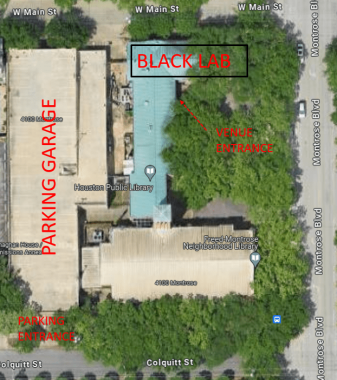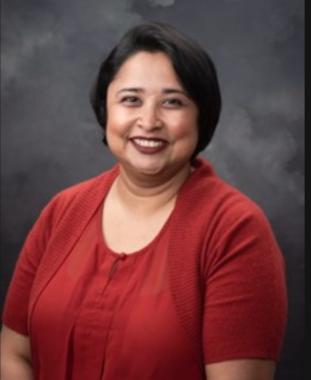Please join the South Texas Section for our monthly dinner and workshop meeting. The dinner keynote will be delivered by Dr. Debalina Sengupta - Coastal Resilience Program Director for Texas Sea Grant at Texas A&M University. The workshop speaker is Dr. Mona Setoodeh - President of CH·IV. The event will take place at the University of St. Thomas Black Lab - we will also learn a little about their engineering program. See map below for event location details, as well as the map link.

We will be presenting our student scholarships at this event so please come to congratulate our winner!!
- 5:00PM - 6:00PM Pre-Dinner Workshop (1 PDH)
- 6:00PM - 6:30PM Social/Networking
- 6:30PM - 7:15PM Dinner
- 7:00PM - 7:30PM Announcements, Scholarships
- 7:30PM - 8:30PM Keynote Presentation (1 PDH)
Workshop Registration
In-Person Registration: No registration needed.
Virtual Attendance Registration
AIChE Dinner Registration
Virtual Attendance Registration
Dinner Registration Fees
- STS Student Members: Free
- This option is for STS Student AIChE members - membership information is required.
- STS YP Member: $10
- This option is for STS YP AIChE members - membership information is required.
- STS Member: $20
- This option is for STS AIChE members - membership information is required.
- Non-Member: $30
- This option is for non-members.
Keynote Presentation
Topic
Disaster Resilience – Are we prepared for the process industries (1 PDH)
Abstract
Chemical Engineering, specifically the domain of Process Systems Engineering, has unique opportunities at the core of manufacturing that contribute towards human civilizations. Over the past 50 years, it has been realized that scientific and technological advances are intricately connected with societal and/or ecological needs and demands. A deeper connectivity between these three broadly classified areas (technology, ecology and society) is crucial for sustainability of the linked systems. Dr. Sengupta’s research focuses on sustainability in the context of Process Systems Engineering. In this talk, she will discuss how advanced process analytical methods are required to analyze the future of energy systems and the need to integrate these methodologies in the engineering disciplines. In recent times, disasters have impacted the manufacturing industries, and a deeper understanding is required for addressing these issues. The talk will focus on disaster resilient systems with specific examples taken from recent work by the author. Starting with the 12 strategies for disaster resilient design for manufacturing facilities1, the topic will cover complex systems analysis through data analytics, life cycle assessment, and optimization methods. Case studies in the domains of resource conservation (water systems modeling at regional scales2), gas utilization3, decarbonization (advanced reforming technologies with carbon sequestration4), and energy mix (pros/cons of biofuels and other renewable energy systems5) will be discussed. The talk will conclude with a futuristic vision for incorporating the disaster resilience concepts for a just energy transition in the Gulf Coast.
About the Speaker

Dr. Debalina Sengupta is an experienced professional working in sustainability and resilience for over 18 years. She is trained as a Chemical Engineer (bachelor’s from Jadavpur University and Doctorate from Louisiana State University) with focus on process systems engineering. She has skills in process design, integration, intensification, optimization, and life cycle assessment. She has worked in academic and governmental settings and held strong collaborations with the private sector. She has expertise in designing problem statements and developing methodologies for solutions in the areas of sustainable manufacturing (discrete and continuous), circular economy, food, energy water nexus, energy transition, and has worked on national priority areas such as sustainable supply chain design of biofuels (with US Environmental Protection Agency), natural gas (with RAPID Manufacturing USA Institute), consumer products (Cooperative Research and Development Agreement between EPA and Procter and Gamble), waste valorization, and decision-making in sustainability and resilience using metrics and indicators.
Dr. Sengupta is currently appointed as the Coastal Resilience Program Director for Texas Sea Grant at Texas A&M University (A National Oceanic and Atmospheric Administration Program) and has courtesy appointments as a fellow at the Institute of Science, Technology and Public Policy at the Bush School of Government and Social Service and as a Graduate Faculty at the Artie McFerrin Department of Chemical Engineering. Previously, she has held the position of Associate Director of the TEES Gas and Fuels Research Center; Water, Energy and Food Nexus Coordinator at Texas A&M Energy Institute; and Lecturer at the Artie McFerrin Department of Chemical Engineering. Her roles included setup of the TEES Gas and Fuels Research Center American operations (in partnership with Texas A&M University Qatar Campus), and implement research, education, outreach, and other representative activities of the Center. She has also maintained the Food Energy Water Nexus Initiative program for the Texas A&M Energy Institute. Her work has included developing collaborative research with researchers from Colombia, Mexico, Brazil, Spain, China, France, Greece, India, Ireland, South Africa, Thailand, Saudi Arabia, Qatar, Kuwait, Egypt, and other countries. She has also led projects that engage underrepresented communities following principles of Diversity, Equity, Inclusion, Justice, and Access (DEIJA), STEM based research, extension, and education.
She has authored two books, “Chemicals from biomass: integrating bioprocesses into chemical production complexes for sustainable development” by CRC Press (2012), and “Measuring Progress towards Sustainability” by Springer (2017). Apart from this, she has several peer reviewed journal publications, book chapters, and conference proceedings. She has been an invited speaker at many national and international conferences.
Dr. Sengupta is extremely well connected through the American Institute of Chemical Engineers (AIChE). She has held official positions of highest order (3 year Director and 4 year Chair terms) at AIChE’s Environmental Division and Fuels and Petrochemicals Division. In 2023, she launched the first Topical on Energy Transition with six sessions and a roundtable panel discussion at the Spring Meeting of AIChE in Houston. She has been responsible as programming chair for the AIChE Environmental Division (2011-2015) and currently serves as co-Chair of Programming for the AIChE Fuels and Petrochemicals Division. She also serves on the Managing Board for AIChE’s Institute for Sustainability, and involved with Center for Energy Initiatives within the organization. She was the inaugural recipient of the Early Career Award from AIChE Environmental Division in 2016, and Programming Award for Fuels and Petrochemicals Division in 2024.
All views presented in this lecture are the opinions of the Author alone and does not reflect any institutional statements.
Pre-Dinner Workshop
Topic
Mastering LNG in the Natural Gas Landscape (1 PDH)
Abstract
In today’s evolving energy landscape, total demand for fossil fuels is projected to peak by 2030, as predicted by energy market experts such as McKinsey & Company. Although a sharp decline in coal demand is expected, natural gas and oil are anticipated to grow further in the next few years and then remain a core part of the world’s energy mix for decades to come. Total natural gas demand is projected to increase through 2040, driven in large part by the balancing role that gas is expected to play for renewables-based power generation until batteries are deployed at scale.
Natural gas pipeline networks are highly integrated systems that move natural gas to end users. Use of pipelines, however, is not always feasible or economical. The alternative mechanism for transporting this energy source is Liquefied Natural Gas (“LNG”). The term is used to describe a variety of liquefied gas mixtures composed primarily of methane and small quantities of heavier hydrocarbons and nitrogen. LNG is formed when natural gas is cooled to around -260°F at atmospheric pressure. Under these conditions, methane gas condenses into a liquid. In liquid form, natural gas is 600 times more compact, making it much easier to transport and distribute.
In this talk, the audience will hear about LNG handling, its characteristics, and why it is such a significant player in the Global Energy Mix. The session will also offer insights on the fundamentals of the LNG Value Chain, types of LNG Facilities, and a high-level overview of various technologies utilized in this industry.
Additionally, the session will provide an overview of the Permitting and Regulatory requirements for construction and operation of various LNG facilities in the United States, and how the LNG Industry demonstrates its continuous commitment to safety as well as environmental stewardship.
About the Speaker

Dr. Setoodeh started her career as a chemical engineer in 2001 and joined CH·IV in 2007. She soon developed her skills in project management and was later appointed as Vice President and General Manager of CH·IV’s Houston office in 2016. Mona has since expanded CH·IV’s service offerings to the industry and led the team through successful completion of numerous major projects.
Dr. Setoodeh is passionate about mentorship, personnel growth, and organizational management, which drove her to further continue her education in this field. Mona has deep respect for individual characteristics and skillsets of the elite team that she serves and looks forward to leading the business to greater success. In 2020, she was appointed as President of CH·IV and has been serving in that role since.
With sustainability and decarbonization in focus, Mona launched company’s low carbon initiative, DeCO2DE, in 2021 to support global efforts of the industry towards carbon footprint reduction and achieving Net Zero.
Dr. Setoodeh is the executive sponsor of the Herstory Makers, committed to recruitment, advancement, and retention of talented individuals, as well as empowering its members to achieve career success and work-life balance through education, networking, and advocacy.
Additionally, Mona is an Industrial Advisory Board member at University of Houston’s Department of Chemical & Biomolecular Engineering.
Dr. Setoodeh holds B.S., M.S., and Ph.D. in Chemical Engineering, and Master’s in Engineering Management.
LinkedIn Page for STS AIChE
Follow our LinkedIn page for updates and RSVP for the monthly meeting event created on our LinkedIn page. Don’t forget to tag the page (type “@South Texas” and select South Texas Section of AIChE) in your personal posts related to STS AIChE.
- Log in to post comments
